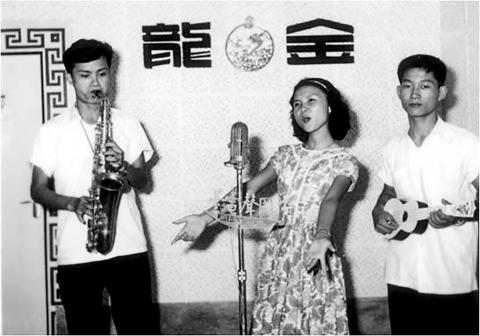While history is mostly presented through text and images, is it impossible for audio, as ephemeral as it is, to be a part of history? It was this question that drove the Changhua County Government’s Bureau of Cultural Affairs to launch its “sounds of history” digitization project.
“There is usually less emphasis on history preserved in sound, but it is an element that could complement our understanding of history from text and imagery,” bureau Director Chen Wen-pin (陳文斌) said.
Using radio stations as an example, Chen said the voice and tone of radio hosts offer a glimpse into the unique atmosphere of an era, while the advertisements shed light on the social and economic conditions.

Photo courtesy of the Changhua County Cultural Affairs Bureau
One of the great sources of preserved audio is the Radio Taiwan International (RTI) branch in the county’s Lugang Township (鹿港), he said.
While the branch is now shuttered, its location on the coastline and relative proximity to China made it an ideal place from which to broadcast psychological warfare programs and gather intelligence following its establishment in 1966, Chen said.
The station holds the world’s only extant recording of former Chinese leader Mao Zedong’s (毛澤東) speech after he swam across the Yangtze River on July 16, 1966, in which he urged young people to “train themselves in the rivers and sea,” he said.

Photo courtesy of the Changhua County Cultural Affairs Bureau
China has even contacted Taiwan to purchase the recording, Chen added.
Orders for Taiwanese intelligence agents operating in China were also broadcast from the station, often as numerical codes, he said.
As such, the station was deemed a military compound and assigned a military garrison, Chen said.
“Hopefully the building that housed the station could be converted into a museum about the Cold War, playing the sounds and voices recorded as the station was broadcasting to the region,” he added.
Another source of preserved audio is the 65-year-old Kuo Sheng Broadcasting Station in Changhua City, Chen said.
The station’s archives hold tens of thousands of vinyl records and tape reels, many of which contain interviews with celebrities and advertisements, he said, adding that the center is a veritable treasure trove for archived audio material.
Changhua County, home to many troupes that have existed for more than a century, is an established center for Beiguan and Nanguan music, and the recordings of the troupes should be digitized and preserved for future generations, he said.
Recordings of interviews with White Terror era victims should also be preserved, Chen said.
As Hoklo (also known as Taiwanese) is the primary language spoken around the county, the unique dialects in different areas should also be preserved, he said.
The ease of travel has led to the withering or outright disappearance of some local dialects, such as the Lugang dialect and the dialect in the Yongjing Township (永靖) area, he added.
Some dialects only exist in the memories of elderly people, and if they are not recorded soon, they will disappear forever, Chen said.

ANOTHER EMERGES: The CWA yesterday said this year’s fourth storm of the typhoon season had formed in the South China Sea, but was not expected to affect Taiwan Tropical Storm Gaemi has intensified slightly as it heads toward Taiwan, where it is expected to affect the country in the coming days, the Central Weather Administration (CWA) said yesterday. As of 8am yesterday, the 120km-radius storm was 800km southeast of Oluanpi (鵝鑾鼻), Taiwan’s southernmost tip, moving at 9kph northwest, the agency said. A sea warning for Gaemi could be issued tonight at the earliest, it said, adding that the storm is projected to be closest to Taiwan on Wednesday or Thursday. Gaemi’s potential effect on Taiwan remains unclear, as that would depend on its direction, radius and intensity, forecasters said. Former Weather Forecast

As COVID-19 cases in Japan have been increasing for 10 consecutive weeks, people should get vaccinated before visiting the nation, the Centers for Disease Control (CDC) said. The centers reported 773 hospitalizations and 124 deaths related to COVID-19 in Taiwan last week. CDC Epidemic Intelligence Center Director Guo Hung-wei (郭宏偉) on Tuesday said the number of weekly COVID-19 cases reported in Japan has been increasing since mid-May and surpassed 55,000 cases from July 8 to July 14. The average number of COVID-19 patients at Japan’s healthcare facilities that week was also 1.39 times that of the week before and KP.3 is the dominant

The Chinese Communist Party’s (CCP) working group for Taiwan-related policies is likely to be upgraded to a committee-level body, a report commissioned by the Mainland Affairs Council (MAC) said. As Chinese President Xi Jinping (習近平) is increasingly likely to upgrade the CCP’s Central Leading Group for Taiwan Affairs, Taiwanese authorities should prepare by researching Xi and the CCP, the report said. At the third plenary session of the 20th Central Committee of the CCP, which ended on Thursday last week, the party set a target of 2029 for the completion of some tasks, meaning that Xi is likely preparing to

US-CHINA TRADE DISPUTE: Despite Beijing’s offer of preferential treatment, the lure of China has dimmed as Taiwanese and international investors move out Japan and the US have become the favored destinations for Taiwanese graduates as China’s attraction has waned over the years, the Ministry of Labor said. According to the ministry’s latest income and employment advisory published this month, 3,215 Taiwanese university graduates from the class of 2020 went to Japan, surpassing for the first time the 2,881 graduates who went to China. A total of 2,300 graduates from the class of 2021 went to the US, compared with the 2,262 who went to China, the document showed. The trend continued for the class of 2023, of whom 1,460 went to Japan, 1,334 went to